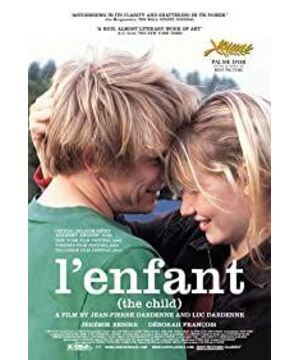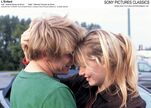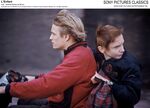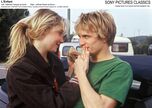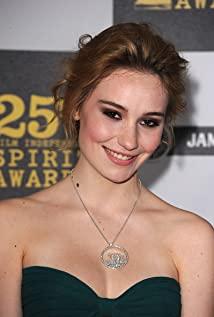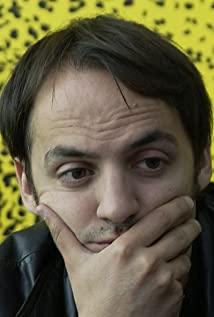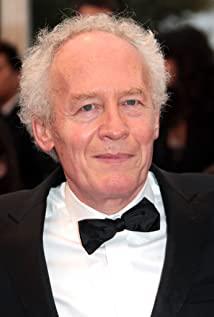The Dutton brothers are undoubtedly a pair of brothers who are very favored by the Cannes Film Festival. After the two made five feature films, they won the Best Picture Award at the Cannes Film Festival twice in 1999 and 2005 respectively. Since the first Cannes Film Festival in 1946, only five directors (strictly speaking, six) have won double Palme d'Or, they are:
Francis. Ford. Coppola
's "Dialogue" (1972), "Apocalypse Now" (1979)
Imamura
's "Shanshan Festival Examination" (1983), "Eel" (1997)
Emile. Kusturica
, "Dad's on a business trip" (1985), "Underworld" (1995)
Bill. Auguste
Pell the Conqueror (1988), Young Love (1992)
, Dutton Brothers
, Beautiful Rosetta (1999), The Child (2005)
in addition to two Palme d'Or The film award, the Dutton Brothers directed "Beautiful Rosetta" in 1999 and "Son" in 2002, also won the throne of Cannes Best Actress and Cannes Best Actor respectively. The Cannes Film Festival's love for the Dutton Brothers' works can be seen. One spot. The Dutton brothers, who are in their 60s, studied philosophy and art. Neither of them came from film majors. Since they established their own film studio in their 30s, they have successively made more than 60 documentaries until 1996. Just released the first drama.
Due to their deep documentary experience, the Dutton Brothers' feature films present a special style of documentary: low-cost small-scale production, hand-held single-camera long-lens follow-up techniques, real social scenes and phenomena, and uncritical issues of humanistic concern for sex. There is a sharp contrast between the Dutton Brothers' film style and philosophy and another pair of rapidly popular American directors, the Coen brothers. The Coen brothers prefer to use exaggerated and extreme story events to highlight the absurd nature of human behavior and destiny. The tone is full of ridicule and ridicule. The Dutton Brothers' works only observe, record and present social predicaments. Through meticulous and superb shooting techniques, the audience "knows" that there is a predicament in society, and at the same time "experiences" the feelings and struggles of the parties involved. If we use Aesop's fable "The North Wind and the Sun" as a metaphor, the Coen brothers are the mournful north wind, and the Dutton brothers are the warm sun.
■In terms of the story itself and the way of shooting, "The Child" is a simple film, focusing on depicting and depicting the life trajectory of a twenty-year-old young Bruno in a certain period of time and an event.
Bruno is a typical street gangster who lives in Seraing, an industrial town in the Walloon region of Belgium, by stealing and selling stolen goods. His nature is not bad, but he has no sense of responsibility and obligation. Bruno has an eighteen-year-old girlfriend who has just given birth to a baby boy, and the impact of the arrival of the newborn on Bruno is the focus of the entire film.
The film begins with Bruno's girlfriend returning to the apartment with her nine-day-old child, only to find that she can't get in because Bruno rented the apartment out while she was in the hospital for production. The girlfriend desperately called Bruno, but couldn't get in touch with him. In the end, she had to take the child to the streets where Bruno often haunted to find him. After the girlfriend finds Bruno, the camera quietly moves from the girlfriend to Bruno, and then follows Bruno all the way.
With no place to live, Bruno took his girlfriend and child to the shelter, where the three temporarily spent the night. The next morning, Bruno left alone to sell stolen goods, then bought a stroller, rented a convertible, and happily returned to the shelter to pick up his girlfriend and children. Bruno first took his girlfriend to the household registration unit to register the birth certificate for the child, and left their names in the parent column, and then drove together for a drive. Because he was in a very happy mood, Bruno used the remaining money to buy a piece of clothing for his girlfriend. A trendy jacket of the same style as yourself. Along the way, though, Bruno never mentions the terms marriage and family, and in fact, judging by the way he spends his money, he doesn't even think about them.
Bruno's lack of understanding of the word "father" culminated in his decision to sell his son. When Bruno was selling a stolen item, the collector heard that he had just given birth to a son, and he casually asked whether he would sell his son. Before that, Bruno didn't have this idea, but since someone mentioned it, it led him to think about it. So when his girlfriend was doing business, Bruno contacted the intermediary, and then went to the designated place to leave the child in exchange for a stack of banknotes. Bruno thought it was just a no big deal, after all, the child was born again, but his girlfriend's reaction terrified him. As soon as his girlfriend heard that the child was sold, she fainted with emotion on the spot.
Bruno hurriedly sent his girlfriend to the hospital, then contacted the agency and told the other party that the girlfriend reacted strongly and would definitely call the police, and he had to exchange the child. Because his girlfriend refused to see Bruno, he asked the nurse to tell him to bring the child back immediately, but when Bruno brought the child back to the hospital, the police were already there waiting for him, and it was his girlfriend who called the police. Bruno lied and said that he was arguing with his girlfriend and tricked her into selling the child. For this reason, he hurried to his mother's house and asked the other party to help him tell the lie. Between this, it can be seen that Bruno's relationship with his family is very poor, and he has to hide from other family members if he wants to see his mother.
Since he had no money, Bruno had to sell the stroller, but before stepping out of the store, the agent took the money and beat him. The agency said that Bruno caused them to lose the agency fee twice, and Bruno was responsible for repayment. Bruno went back to the apartment and asked his girlfriend to forgive him, but his girlfriend ignored him at all, and was so angry that he wanted to chop him with a knife. Bruno had to hide in the street late at night to spend long nights, keeping warm with cardboard boxes. In a desperate situation, Bruno finds the middle school students who used to work together to steal things. The two of them ride a borrowed motorcycle and rob the handbag of a woman on the road. Unexpectedly, the woman and her husband were chasing the car all the way, and Bruno finally had to abandon the car with the middle school student and hide in the cold river.
Because the river was too cold, the middle school students froze and almost drowned. Bruno worked hard to pull the middle school student out of the river, put him on his back in a small work shed, and after ensuring that he would not run away alone with the money, he turned back to find the money that was hidden nearby and stolen. As a result, the police arrived immediately, and Bruno could only hide and watch them take the middle school students away. Because the locomotive had a flat tire, Bruruo pushed the car all the way. He first went back to his girlfriend's apartment, who wouldn't open the door or respond to his cries, before continuing to push the cart to the police station. There, he met the middle school students. In front of the prosecutor and the middle school students, he handed the locomotive keys to the middle school students, then took out his money and put it on the table, admitting that he was the mastermind of the crime.
At the end of the film, Bruno's girlfriend came to see him in prison. The two sat down at the table in the visiting room. Bruno never said a word. He bowed his head, his shoulders began to twitch, and then he burst into tears.
■"Children" adopts the most simple method to present a real social problem, making a feature film have the effect and influence of a documentary. In the whole film, there is only one perspective and one sequence, and the camera always follows the character Bruno, quietly observing his every move. However, different from ordinary documentaries, in this film, which is connected by many medium-distance and long-lens shots, there is absolutely no sense of rupture and picture jumping unique to documentaries. Every shot and segment is obviously carefully designed. In the process of moving the mirror, there is no trace of the axe.
The two most important scenes in the film are the scenes where Bruno sells the child and redeems the child. In these two scenes, the person who bought the child never appeared on the camera, nor did he meet Bruno. Bruno just followed the instructions on the phone call, put the child or the money in the designated place, then hid in another room and waited for the person who bought the child to take the child or take the money. In this, apart from Bruno and a mobile phone, there is no dialogue, soundtrack, action or opponent, but the director uses subtle light and shadow changes to arouse the audience's emotions:
the room where the children are kept is extremely dark, and Bruno's own room is half-lit It is half dark, but the space leading to the two rooms is very bright. While selling the child, Bruno walked through the bright aisle and left the child in the dark, then stood behind the semi-dark door, and listened uncomfortably to the sound outside. When redeeming the child, Bruno stood behind the half-dark sliding door, also listening uncomfortably to the sound of the car leaving, then walked through the bright sunlight, carried the child out of the dark room, and walked in. Sunlight.
In between, only through the strong contrast of light and dark, the audience's own emotions and perception of Bruno constantly fluctuate. When selling the child, the audience will naturally feel extremely unpleasant and unbearable when they see the child being left in the dark, and then wait nervously with Bruno, when they return to the dark room and see that the child is gone Disgust and anger towards Bruno arise spontaneously. While redeeming the child, when Bruno listened to the sound of the car leaving behind the door, the audience naturally felt nervous. It was not until Bruno took the child out of the darkness that he felt relaxed, and his impression of Bruno also changed. Move from anger to forgiveness and consideration.
It is these two closely connected events, the simple arrangement of these two scenes, that separates the first half and the second half of the whole film. In the first half, what everyone sees is Bruno's naivety and irresponsibility, and he is bored and disgusted with him. In the second half, what everyone sees is how an ignorant boy suffers because of his ignorance, and he develops understanding and sympathy for him. It is these subtle and inscrutable designs that make this film both the real simplicity of a documentary and the moving tension of a drama. Compared with American films that are accustomed to using exaggerated expressions and editing jumps to mobilize emotions, and European films that are used to using tactful soundtracks and symbolic things to express ideas, the Dutton brothers' approach is indeed different.
■The reason why "The Child" won the Palme d'Or is partly because of the Dutton Brothers' special narrative technique, and partly because of the Dutton Brothers' unique social care complex. Since entering the film industry, the Dutton brothers have been dedicated to presenting the plight of the lower classes. The background town of Seraing in "The Child" used to be an important industrial town in Belgium. However, since the 1960s, factories have closed down one after another, causing a lot of unemployment and social problems. There are also serious air pollution problems in the local area.
The protagonist Bruno in "Children" is a young man who can be seen everywhere in Seraing. Their poor family background makes them drop out of school very early and can only make a living on the streets. In addition to being unable to find suitable jobs, these children who are not bad by nature also don't have many opportunities to learn the truth of being a person and doing things. They can only learn from mistakes over and over again in the process of scrambling and crawling. Prison is often a life stop that they must pass through. As for whether they can fully wake up and return to the right path, it depends on their luck.
The Dutton brothers had a very obvious intention to make the film "Children", hoping to present a real social problem through real methods and arouse everyone's understanding and attention. In fact, after the Dutton brothers won the Palme d'Or at Cannes in 1999 for "Beautiful Rosetta", the Belgian government was alarmed that there was still a problem of unequal work rights for young people in society, and then enacted a new bill called
Should international film festivals consider the social and political impact of films when judging the artistic value of films? This is a matter of opinion. In 2010, Iranian director Jafar Panahi was arrested and jailed for a film that attacked the authorities and was later sentenced to six years in prison. So this year's Berlin Film Festival awarded the best film and best actor and actress awards to the Iranian work "Separation". This kind of award result with strong political association, everyone has different ideas. But for the French actress Juliette Binoy at the 2010 Cannes Film Festival when she promised to take the stage to receive the Best Actress Award, she showed a sign with Jaffa Panassi's name on it. Female stars only have absolute rewards.
View more about The Child reviews


